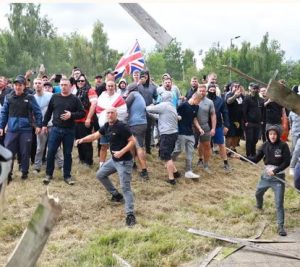Opinion – Racism, ignorance and social media
 The images coming out Britain showing violent mobs protesting against asylum seekers are disturbing for observers and worse for the innocent people caught up in the mayhem.
The images coming out Britain showing violent mobs protesting against asylum seekers are disturbing for observers and worse for the innocent people caught up in the mayhem.
The term ‘right wing thuggery; has been bandied about to describe disorder, not least by UK Prime Minister Keir Starmer.
A clue to what is really going on can be found in the sounds and images of the violent disturbances. And there might be lessons for Australia in them.
Most of the perpetrators appear to be young men mostly dressed in black, yelling, thumping their chests and throwing things.
And the language used amounts to racist chants expressing an enduring prejudice towards migrants, and particularly Muslims. It is reminiscent of the vile, vilifying chants about ‘Pakis’ that were so common in Britain on the 1970s and 1980s.
It’s obvious the hate runs deep, with the language of violence from decades ago has, dusted off an put back into service.
The violence seems to stem from anger and economic deprivation, commonplace in Southport, Rotherham, Sunderland, Bristol and parts of London, some of the places where the worst of violence has occurred.
Since medieval times, young men frustrated by a lack positive things to engage their time and attention have found it attractive to gang up to abuse others.
I know these people. Occasionally, I stood next to them on the terraces of the old Highbury football ground in London.
They find identity and satisfaction in experiences of tribalism, aggression and domination.
In the modern age they are fodder for social media manipulation through misinformation.
In this instance, they appear to have been targeted by a blizzard of cues from social media posts to support right wing protests against the new British government’s policies and against agencies, such as police forces, who are identified as defending a progressive elite.
False and mischievous social media posts on the July 29 murder of three young girls at a dance studio said that the 17-year-old suspect, whose identity was initially concealed because of laws protecting the identity of minors, was a Muslim asylum seeker.
That misinformation sparked a torrent of far-right protests and counter protests across the UK.
After mounting media pressure, a judge revealed the name of the youth charge with the killings as Axel Rudakubana, who was born in Cardiff, Wales, and is not Muslim.
Facebook posts, images shared on other platforms and lists of national targets forwarded on WhatsApp groups contributed to the organised wave of uprisings that began as one isolated incident in the Lancashire town of Southport, the scene of the crimes.
One claim that an asylum seeker or migrant was responsible for the Southport stabbing reached at least 15.7 million accounts across a number of social media platforms, local reports said.
A news channel also published an unsubstantiated claim that the attacker had arrived in the UK on a small boat, before apologising for the erroneous reporting.
Social media has become an essential tool for extremist groups to galvanize support and spark outbursts of protest or violence.
Experts say what happened in the UK over those tumultuous days, could not have happed without it.
Social media creates the background noise and permissive environment that enables violent or radical individuals to engage in herd mentality.
While the tough judicial response to the violence from UL Prime Minister Keir Starmer and local authorities is welcome, there are two bigger jobs to be done.
The first is the need to deliver and educative narrative that replaces the language of violence, division and thuggery with a voice of calm reason that speaks to universal justice, human rights and our common humanity.
The other job is to rein in the tech giants and apply the same regulated standards of behaviour to social media platforms that apply to almost every other industry.
Australia would do well to watch how this plays out in the UK.
Laurie Nowell












